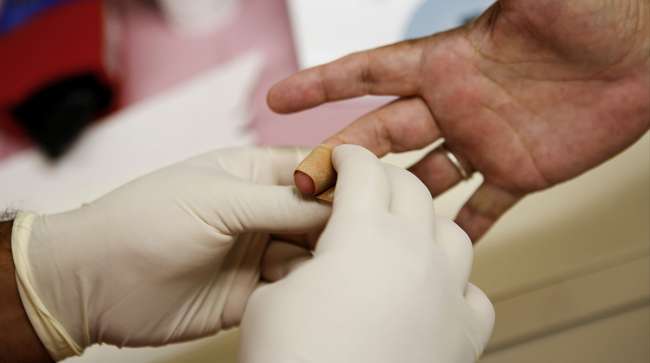Senior Reporter
FMCSA Plan to Eliminate Exemptions for Diabetic Drivers in Limbo

Greg Crawford, an insulin-dependent commercial motor vehicle driver from Oak Park, Mich., says he had to wait months for a medical expert’s verification that his condition was stable before federal regulators cleared him to get back behind the wheel.
“I’ve been off work for nine months — causing lots of financial hardship — due to waiting for further due process from the Federal Motor Carrier Safety Administration,” Crawford, 50, wrote in a comment to the agency in August. “It’s been a rough road these nine months, but I survived. So I hope to hear good news from this outcome that is the medical doctor’s call for such drivers as myself.”
Crawford did get good news a few weeks later, when FMCSA granted him a two-year medical exemption after agency officials were convinced that, despite his medical condition, he was as safe as any other driver.
Crawford’s wait was longer than most, but the challenges he faced were no different than thousands of other insulin-dependent drivers who since 2003 have been automatically disqualified from driving a truck or bus, forced to go through a sluggish bureaucratic exemption process that can take up to six months.
As a result, the wait has forced some drivers to get temporary jobs while others struggle financially and some even exit the profession they love.
“The exemption program was a step in the right direction and illustrated it is possible to evaluate insulin-treated drivers and certify only those whose diabetes is well-managed and does not pose safety issues,” Katie Hathaway, vice president of legal advocacy for the American Diabetes Association, told Transport Topics. “But the exemption program is cumbersome and does not allow for immediate medical certification after evaluation by a physician knowledgeable in diabetes. It’s time to reduce some of the administrative barriers to medical certification that do not add anything to the safety assessment.”
Although treatment for diabetics has vastly improved over the years, there are potential problems for drivers not in control of their condition.
Of particular concern for drivers are the immediate symptoms of severe hypoglycemia — a condition where insulin treatment may cause blood glucose to drop to a dangerously low concentration. A person experiencing hypoglycemia may have one or more of the following symptoms: double or blurry vision, shaking or trembling, tiredness or weakness, unclear thinking, fainting, seizures or coma, according to medical experts.
“Individuals who apply for an exemption must be evaluated by a board-certified or board-eligible endocrinologist, and that endocrinologist must assess the driver against the various medical, safety and operating guidelines of the program,” Hathaway said. “Drivers who are granted an exemption are then required to submit to quarterly endocrinologist evaluations, as well as annual reviews, also by an endocrinologist.”
I’ve been off work for nine months — causing lots of financial hardship — due to waiting for further due process from the Federal Motor Carrier Safety Administration.
Greg Crawford, an insulin-dependent commercial motor vehicle driver
Hathaway suggested that FMCSA has been working on a potential solution since a 2006 proposal died, but was essentially revived in a similar notice of proposed rulemaking in May 2015.
The 2015 proposed rule has yet to be finalized, despite more than 1,200 written comments, most in support of the idea.
Many of those supporters say a final version of the rule could take the agency out of the process and place it in the hands of a professional responsible for prescribing insulin for the driver’s diabetes and could also provide documentation to a medical examiner that the driver’s condition is stable and well-controlled.
However, the 2015 proposal has been dormant the past 30 months and, at press time, FMCSA officials have declined to explain the reasons for the delay.
One of the supporters of the proposal was Dan Gladen, a 39-year-old truck driver from Minnesota who also is an insulin-dependent diabetic.
“I really hope this happens. There are a ton of paperwork hoops to jump through just to be accepted into the exemption program, not to mention keeping the exemption,” Gladden wrote. “Long story short, if a driver ends up on insulin there is a good chance they will quit trucking because of the time without income and all the paperwork it takes to get it.”
FMCSA doesn’t agree, citing the fact that roughly two of every three drivers who apply for the exemption are granted a two-year medical certificate.
“The reality is that the tools of diabetes management available today make the safe operation of commercial motor vehicles not only possible but the expectation,” Hathaway said. “And 14 years of the diabetes exemption program has shown that it is possible to properly evaluate and monitor commercial motor vehicle drivers with insulin-treated diabetes.”
In comments filed with FMCSA in September, American Trucking Associations said it supported elimination of the exemption process, in part due to a severe shortage of truck drivers.
“ATA still has some concerns with FMCSA’s implementation and guidance to certified medical examiners,” ATA wrote. “ATA hopes that FMCSA reviews all stakeholder concerns to ensure the finalized diabetes standards create a fair and equal process to new and existing drivers with insulin-treated diabetes mellitus.”
But the public safety nonprofit, Road Safe America, has opposed dropping the exemption process, citing the potential side effects of the condition.
“When we put people behind the wheels of 80,000 pound rigs on public roads, there should be no doubt that they are healthy enough to capably drive that rig safely for 11 hours a day,” the group wrote in recent comments.




